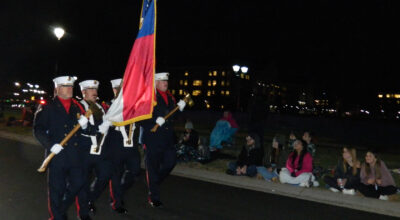Mayors gather in Spencer to hear update on laws, state budget
Published 12:00 am Thursday, June 6, 2013
SPENCER — A small group of North Carolina mayors gathered in Spencer on Wednesday for a meeting of the Regional Conference of Mayors of the Central Carolinas.
They heard an update from Paul Meyer, of the N.C. League of Municipalities, on the ongoing state budget process and legislation passed or proposed in Raleigh that might affect cities’ and towns’ revenues and policymaking powers.
The informal meeting, scheduled to last two and a half hours, was held at the N.C. Transportation Museum.
Only a handful of mayors from the 16 counties in the Carolinas that make up the Regional Conference were in attendance.
Among them were Spencer Mayor Jody Everhart, East Spencer Mayor Barbara Mallett and Granite Quarry Mayor Mary Ponds.
Salisbury Mayor Paul Woodson was not present.
Meyer’s update focused on matters that could affect local governments’ ability to make laws and establish policy.
Meyer said N.C. House members are “taking their time” working through their version of the budget.
He said he expects a final House budget to be voted on next Wednesday and Thursday, but that the Senate will not concur.
Differences of opinion regarding proposals to overhaul the state’s tax structure are one sticking point, Meyer said.
Meyer said his sources indicate that discussions of the House and Senate budgets will take about two weeks, with a final state budget expected to pass on Friday, June 28.
“Of course, it’s all uncertain because the two bodies are so far apart on taxes,” Meyer said.
This week, members of the N.C. House have hotly debated Republican-led plans to change tax rates and reduce some deductions – among them, a possible limit on the home mortgage interest deduction.
Tuesday, an N.C. House panel endorsed a tax plan that added in $500 million in deductions.
Meyer then discussed a number of bills proposed in the General Assembly, noting the League of Municipalities’ support for, or opposition to, particular legislation.
“As cities, we are having a very, very good session,” Meyer said.
Pulling examples from a 25-page printout of a presentation, Meyer called attention to some controversial bills that would have expanded open-meetings provisions.
One of them is SB 331, the so-called “Sunshine Amendment,” which would have opened all public meetings and records except for those specifically exempted.
The bill would also have required a two-thirds vote of the General Assembly for future exemptions.
Meyer called this proposal a “bad bill” and said that it would not move forward this term.
Other bills that Meyer said lobbying pressure had helped to forestall include SB 703, which would have prohibited local governments from restricting or banning smoking in parks, beaches and other public areas.
Among those still being discussed, Meyer said, are four bills in the N.C. House and Senate which would allow local governments to post public meeting notices, and other notices required by law, on their websites.
Currently, governments are required to advertise public meetings, quorums and other notices in local newspapers.
Meyer said that allowing online notices would save taxpayer funds, and also noted opposition to those bills by groups, including the N.C. Press Association.
He said there is “significant support” for online public notices, and that action may yet be taken on one or more of the current bills.
“Like everything, there’s horse-trading that goes on,” Meyer said.
The controversy over so-called electronic sweepstakes gaming is the subject of HB 547, which Meyer said would legalize such gaming operations and allow municipalities to tax and regulate them.
He said the bill “is not going to go anywhere,” but noted that some sweepstakes operators have begun filing lawsuits against cities and towns where they operated.
Five months ago, the state Supreme Court upheld a Dec. 2010 ban on electronic sweepstakes gaming.
Some cities and towns allowed gaming operations while lawsuits concerning the ban made their way through the appeals process.
“Instead of trying to promote a legislative agenda … you’re going to see the industry try to sue their way out,” Meyer said.
He asked local representatives to inform the League of Municipalities if they are sued by sweepstakes operators, and said seven cities had already been targeted by lawsuits, though he did not specify the cities in question.
Because the gathering was not a formal meeting of a governing body, Centralina Council of Governments Executive Director Jim Prosser requested that the Salisbury Post leave the meeting room following Meyer’s presentation, so that the mayors could discuss the issues and ask questions of Meyer.
Prosser said there was concern that officials would not be able to have a candid discussion of the issues if the media was present during that part of the meeting.
Kluttz visits
Prior to dinner and discussion, Spencer Mayor Jody Everhart welcomed the group and introduced former Salisbury Mayor Susan Kluttz, now a member of Gov. Pat McCrory’s cabinet.
Kluttz became secretary of the N.C. Department of Cultural Resources in January.
Although not part of the official program, Kluttz spoke briefly before leaving to return to Raleigh.
Kluttz told the Post she was glad for area mayors to see “one of our historic sites.”
“I am especially proud to show it off, being from here,” Kluttz said.
Cultural resources, she said to the assembled mayors and officials, are engines that support growth.
“We have 27 historic sites, and I tell you, everywhere I went, people have said, ‘This is our economic development, don’t let anything happen to this.’”
She said she hopes local governments will support McCrory’s plans to overhaul personnel laws, reorganize the Commerce Department and improve transportation.
As for the local historic site, standing in the Roundhouse, Kluttz said, “I’ll do everything I can do for this Transportation Museum. As soon as we get done with this budget, we get back to these historic sites.”
Contact Hugh Fisher via the editor’s desk at 704-797-4244.





